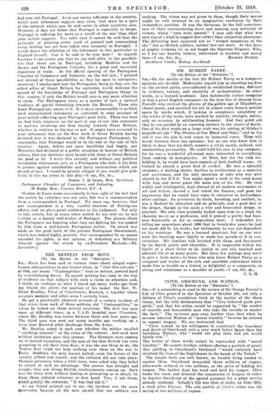SIR HUBERT PARRY.
(To THE EDITOR OF THE " SPECTATOR."] Ste,—On the merits of the late Sir Hubert Parry as a composer opinions are divided. Modernists regard him as standing too firm on the ancient paths, over-addicted to established forms, deficient in richness, variety, and elasticity of orchestration : in other words, as a learned academic. Less fashionable critics recognize in him a great English composer—in the true line of descent from Purcell—who revived the glories of the golden age of Elizabethan choral music, and enriched his art in almost every branch outside opera by works which, if lacking in sumptuous upholstery or the tricks of the trade, were marked by nobility, strength, sanity, and, on occasion, by exhilarating humour. And they point out that he was guided by an unerring instinct in the choice of words. One of his first works on a large scale was his setting of Shirley's magnificent ode " The Glories of Our. Blood and State," and to the end it was his aim to wed music to immortal verse. Time will decide between these two opinions : but no one who knew him is likely to deny that his death removes a vivid, manly, radiant, and commanding personality. He could hold his own in any company, for he was a wonderful all-round man, interested in everything, from cooking to metaphysics. At Eton, but for the rule for- bidding it, he would have been captain of both football teams. At Oxford he played a great deal of cricket. He was a splendid swimmer, a dashing skater, fearless to recklessness as a motorist and yachtsman, and the only musician of note who was ever elected to the R.Y.S. You might spend a week in the same house with him and never guess the main aim of his life. He read widely and intelligently, kept abreast of all modern movements in art and letters, showed a real talent for finance, and gave the impression that he would have risen to eminence in half-a-dozen other callings. An aristocrat by birth, breeding, and instinct, he was a Radical by education and on principle, and a good deal of the despot, though in the main a wise and benevolent despot, in practice. His own class probably looked upon him as a freak for choosing music as a profession, and it proved a pretty bad busi- ness financially so far as composition went. I remember his telling me somewhere about 1898 that in twenty-five years he had not made £25 by his works; but fortunately he was not dependent on his earnings. He was a learned musician, but no one ever wore his learning more lightly or made less parade of it in con- versation. His familiar talk bristled with slang, and fascinated by its boyish gaiety and absurdity. It is impossible within tho limits of a short letter to do justice to one who touched and adorned life at so many points. But these few jottings may serve to give a faint nailed to those who only knew Hubert Parry as a composer and writer of the rich and manifold endowment which made him so lovable as a friend, so delightful as a companion, so strong and wholesome as a moulder of youth.—I am, Sir, &c.,
C. L. G.


































 Previous page
Previous page